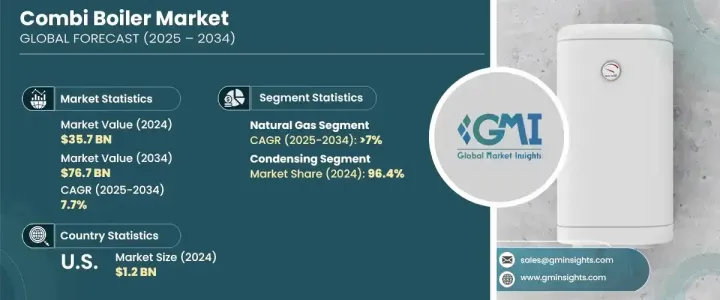
세계의 콤비 보일러 시장은 2024년에는 357억 달러로 평가되었고 에너지 효율이 높은 주거용 난방 시스템의 채택 증가와 배출 가스 규제의 엄격화에 의해 2034년에는 767억 달러에 달할 것으로 예측되며, CAGR 7.7%로 성장할 전망입니다.
각국 정부가 배출량 감소를 위한 인센티브를 도입하고 엄격한 정책을 시행함에 따라, 첨단 친환경 보일러에 대한 수요가 증가하고 있습니다. IoT 통합과 같은 기술적 혁신은 원격 모니터링과 실시간 진단 기능을 제공하여 보일러를 더 스마트하고 효율적으로 만듭니다. 이러한 업그레이드는 주거용 및 경량 상업용 응용 분야에서 운영 안전성을 향상시키고, 더 나은 제어 기능을 제공하며 시스템 신뢰성을 강화합니다.

탄소 배출량 감축에 대한 강조가 강화되면서 시장은 더 깨끗하고 효율적인 난방 시스템으로 이동하고 있습니다. 이는 스마트 홈의 확산과 함께 통합 시스템이 원격 제어 및 모니터링을 가능하게 함에 따라 더욱 가속화되고 있습니다. 콤비 보일러, 특히 저장 탱크가 필요 없는 보일러는 컴팩트한 디자인과 에너지 효율적인 작동으로 인기를 얻고 있습니다. 또한, 새로운 수소 대응 모델은 지속 가능한 에너지 솔루션에 대한 수요를 충족하기 때문에 시장 성장을 촉진할 것으로 예상됩니다.
| 시장 범위 | |
|---|---|
| 시작 연도 | 2024년 |
| 예측 연도 | 2025-2034년 |
| 시작 금액 | 357억 달러 |
| 예측 금액 | 767억 달러 |
| CAGR | 7.7% |
천연 가스 콤비 보일러 부문은 효율성을 개선하고 비용을 절감한 가스 추출 기술의 발전에 힘입어 2034년까지 7%의 CAGR을 기록하며 꾸준한 성장세를 유지할 것으로 예상됩니다. 천연 가스 시스템은 설치 및 운영 비용이 상대적으로 낮기 때문에 주거 및 상업용으로 더욱 많이 채택되고 있습니다. 지속 가능하고 환경 친화적인 기술로의 전환에 따라 천연 가스 콤비 보일러는 비용 효율적이고 효율적인 난방 솔루션에 대한 수요를 충족시키기 위해 유리한 위치에 있습니다.
콘덴싱 콤비 보일러는 2024년 시장 점유율 96.4%를 차지하며 시장 내 지배적인 선택지로 유지되고 있습니다. 이는 배기 가스에서 추가 열을 추출하는 에너지 효율적인 설계로 인해 전통적인 시스템보다 높은 효율성을 달성할 수 있기 때문입니다. 이 에너지 효율적인 기능은 에너지 소비를 줄일 뿐 아니라 난방 시스템이 환경에 미치는 영향을 최소화합니다. 정부와 소비자들이 지속 가능성과 비용 효율성을 우선으로 생각함에 따라, 엄격한 환경 규제와 가정용 난방 시스템에 친환경 기술의 채택이 증가함에 따라 응축 보일러에 대한 수요가 증가할 것으로 예상됩니다.
미국의 콤비보일러 2024년 시장 규모는 11억 달러로, 도시화가 가속화되고 주택 리모델링 프로젝트가 증가함에 따라 지속적인 성장이 예상됩니다. 에너지 효율이 높은 난방 시스템으로의 전환은 오래된 주택을 현대적이고 환경 친화적인 솔루션으로 개조하는 추세가 증가함에 따라 더욱 촉진되고 있습니다. 에너지 비용이 계속 상승하고 주택 소유자들이 탄소 발자국을 줄이려고 노력함에 따라 에너지 효율이 높은 보일러의 채택이 더욱 널리 보급되고 있습니다.
세계의 콤비 보일러 시장의 주요 기업은 Rheem Manufacturing, Bosch, Daikin Industries, Navien, AO Smith와 같은 기업이 포함되어 있습니다. 이들 기업은 혁신에 집중하고 제품 포트폴리오를 확장하며 에너지 효율적이고 환경 친화적인 제품을 제공함으로써 시장 지위를 강화하고 있습니다. 많은 제조업체들은 경쟁이 치열한 시장에서 차별화를 위해 고객 서비스와 사후 지원에 투자하고 있습니다. 또한, 연결형 홈 솔루션에 대한 수요 증가를 활용하기 위해 IoT 기반 스마트 보일러 제공 등 새로운 비즈니스 모델을 탐색하고 있습니다.
The Global Combi Boiler Market was valued at USD 35.7 billion in 2024 and is estimated to grow at a CAGR of 7.7% to reach USD 76.7 billion by 2034, driven by the increasing adoption of energy-efficient residential heating systems and stricter government regulations on emission control. As governments introduce incentives and implement stringent policies to reduce emissions, the demand for advanced, environmentally friendly boilers is rising. Technological advancements like IoT integration, which enables remote monitoring and real-time diagnostics, make boilers smarter and more efficient. These upgrades improve operational safety, offer better control, and enhance system reliability for residential and light commercial applications.

The growing emphasis on reducing carbon emissions pushes the market toward cleaner and more efficient heating systems. This is further supported by the rise in smart homes, where integrated systems that allow remote control and monitoring are becoming increasingly popular. Combi boilers, particularly those that don't require storage tanks, are gaining popularity due to their compact design and energy-efficient operation. In addition, new hydrogen-ready models are expected to drive market growth as they cater to the demand for sustainable energy solutions.
| Market Scope | |
|---|---|
| Start Year | 2024 |
| Forecast Year | 2025-2034 |
| Start Value | $35.7 Billion |
| Forecast Value | $76.7 Billion |
| CAGR | 7.7% |
The natural gas combi boiler segment is projected to maintain a steady growth trajectory, with an expected CAGR of 7% through 2034, fueled by advancements in gas extraction technologies, which have improved efficiency and reduced costs. The relatively low installation and operational expenses of natural gas systems further drive their adoption in residential and commercial applications. With a shift towards more sustainable and eco-friendly technologies, natural gas combi boilers are well-positioned to meet the demand for cost-effective and efficient heating solutions.
Condensing combi boilers remain the dominant choice within the market, accounting for 96.4% in 2024, attributed to their energy-efficient design, which extracts additional heat from exhaust gases, allowing them to achieve higher efficiency levels than conventional systems. This energy-efficient feature not only helps reduce energy consumption but also minimizes the environmental impact of heating systems. As governments and consumers prioritize sustainability and cost-efficiency, the demand for condensing boilers is expected to rise, driven by stringent environmental regulations and the growing adoption of green technologies in home heating systems.
United States Combi Boiler Market was valued at USD 1.1 billion in 2024, with expectations for continued growth as urbanization accelerates and home renovation projects increase. The shift towards more energy-efficient heating systems is further stimulated by the growing trend of retrofitting older homes with modern, environmentally friendly solutions. As energy costs continue to rise and homeowners seek to reduce their carbon footprint, adopting energy-efficient boilers is becoming more widespread.
The key players in the Global Combi Boiler Market include companies such as Rheem Manufacturing, Bosch, Daikin Industries, Navien, and A.O. Smith. These companies are enhancing their market position by focusing on innovation, expanding product portfolios, and offering energy-efficient and environmentally friendly products. Many manufacturers invest in customer service and after-sales support to differentiate themselves in the competitive market. Additionally, they are exploring new business models, such as providing IoT-enabled smart boilers, to tap into the growing demand for connected home solutions.